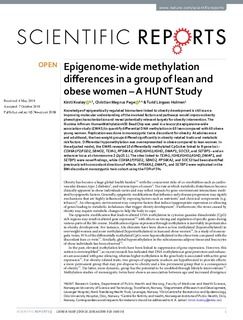Epigenome-wide methylation differences in a group of lean and obese women – A HUNT Study
Journal article, Peer reviewed
Published version
Permanent lenke
http://hdl.handle.net/11250/2583346Utgivelsesdato
2018Metadata
Vis full innførselSamlinger
Originalversjon
10.1038/s41598-018-34003-8Sammendrag
Knowledge of epigenetically regulated biomarkers linked to obesity development is still scarce. Improving molecular understanding of the involved factors and pathways would improve obesity phenotype characterization and reveal potentially relevant targets for obesity intervention. The Illumina Infinium HumanMethylation450 BeadChip was used in a leucocyte epigenome-wide association study (EWAS) to quantify differential DNA methylation in 60 lean compared with 60 obese young women. Replication was done in monozygotic twins discordant for obesity. At adolescence and adulthood, the two weight groups differed significantly in obesity-related traits and metabolic risk factors. Differential hypomethylation was overrepresented in obese compared to lean women. In the adjusted model, the EWAS revealed 10 differentially methylated CpG sites linked to 8 gene loci – COX6A1P2/FGD2, SBNO2, TEX41, RPS6KA2, IGHE/IGHG1/IGHD, DMAP1, SOCS3, and SETBP1– and an enhancer locus at chromosome 2 (2p25.1). The sites linked to TEX41, IGHE/IGHG1/IGHD, DMAP1, and SETBP1 were novel findings, while COX6A1P/FGD2, SBNO2, RPS6KA2, and SOCS3 had been identified previously with concordant direction of effects. RPS6KA2, DMAP1, and SETBP1 were replicated in the BMI-discordant monozygotic twin cohort using the FDR of 5%.

